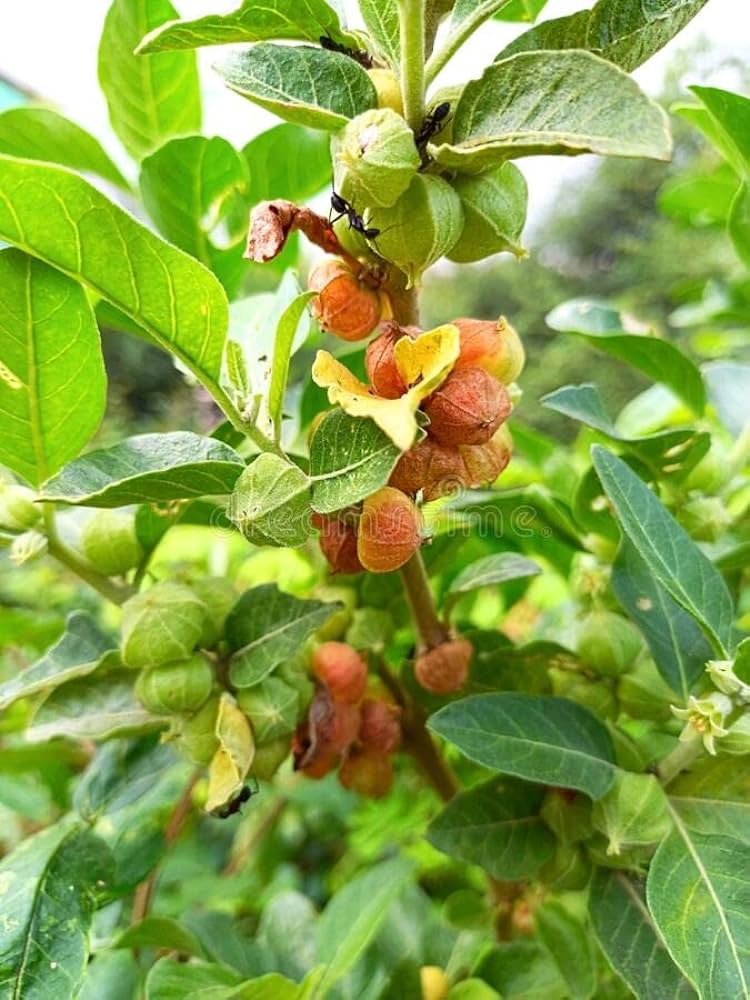ASHWAGANDHA
(Veterinary uses of Ashwagandha)
ABSTRACT –
Withania somnifera (Ashwagandha) is a shrub of the family Solanaceae.It commonly grows in Asia and Africa and is used for stress. It is traditionally used as an adaptogen and used to promote health and longevity in both humans and animals.
Also known as Indian Ginseng, it is also used for insomnia, ageing , anxiety and many other conditions.
Nutritional value of Ashwagandha –
In 100 grams of Ashwagandha,
Energy – 250 g
Total dietary fibre – 25 g
Carbohydrate – 75 g
USES–
• Ingestion of Ashwagandha seems to improve anxiety.
• It also acts on insomniac and provide overall sleep and quality of sleep in some people.
• It reduces stress.
• It might help with pain relief, sleep and also act as an astringent.
• It may be antihelminthic.
• It may be thermogenic.
• It may be antipyretic.
• It may be thyroprotective.
• Studies show, it can slow, stop and possibly reverse certain types of nerve cell damage.
• It may also be neuroprotective, that is it may help prevent the development of some neurodegenerative diseases.
However, when taken by mouth or ingested, long term safety of Ashwagandha is not yet know. It may cause gastrointestinal problems like diarrhoea, vomiting etc if consumed in large doses. Liver problems including severe liver failure and need for liver transplantation might also occur.
VETERINARY USE OF ASHWAGANDHA –
Ashwagandha, being an adaptogen falls under a group of natural, herb based remedies that promote balance in the body.
They act as a substance beneficial for the animal’s mental health, specially for dogs. They reduce emotional and physical stresses that helps dogs to live the best life possible.
• Adaptogens balance out internal endocrine, hormonal and enzyme systems or external stresses.
• They can also maintain normal fluid levels.
• They support healthy blood sugar, blood pressure and normal thyroid and adrenal gland function .
• Dog owners use ashwagandha to supplement other medications, or as preventive measure to help their pets from other common issues.
• Ashwagandha helps in fear, separation anxiety, physical discomfort that cause stress.
• It also enhance immune system and in turn treat anemia, inflammation, bacterial infections, bowel issues or diarrhoea.
• It relieves general aches and pains.
• It contains high level of iron and free amino acids.
• It can help prevent and reduce tumours in animals.
• It acts as an anti-inflammatory.
• It also acts as a diuretic.
• It has its actions as sedative.
• It also helps in antibacterial and antifungal treatment.
The roots are extensively used as an adaptogen and for health issues.
The present study aimed to evaluate the clinical efficacy or ashwagandha against various stresses in horses.
The study, over 21 days shows a statistically significant increase in total erythrocyte count, total leukocyte count, haemoglobin content, lymphocyte percentage, reduced glutathione, and superoxide dismutase activities was observed. A statistically significant decrease in cortisol, epinephrine, glucose, triglycerides, creatinine, IL-6 , alanine aminotransferase, and aspartate aminotransferase was observed in ashwagandha treated horses subjected to different stresses.
The results suggest that ashwagandha root extract has potent hemopoetic, antioxidant, adaptogenic and immune stimulant properties.
When and how much to feed-
• If the dog is already under any other medications for stress and anxiety, check with the vet first before adding ashwagandha to the mix.
• It is advised that ashwagandha to be added to the feed slowly.
• It should be fed in optimum dosage. This can often depend on the size, weight of the dog.
ACKNOWLEDGEMENT–
I would like to thank the department of Veterinary and Animal Husbandry Extension Education, Lakhimpur college of veterinary science in general and specially Dr. Biju Borah sir to have given us the opportunity to explore and add to our knowledge about such interesting topics.
REFERENCES –
-Submitted by
Banashree Saikia
Third professional year, BVSc & AH
Lakhimpur college of veterinary science, Joyhing, North Lakhimpur, Assam.
